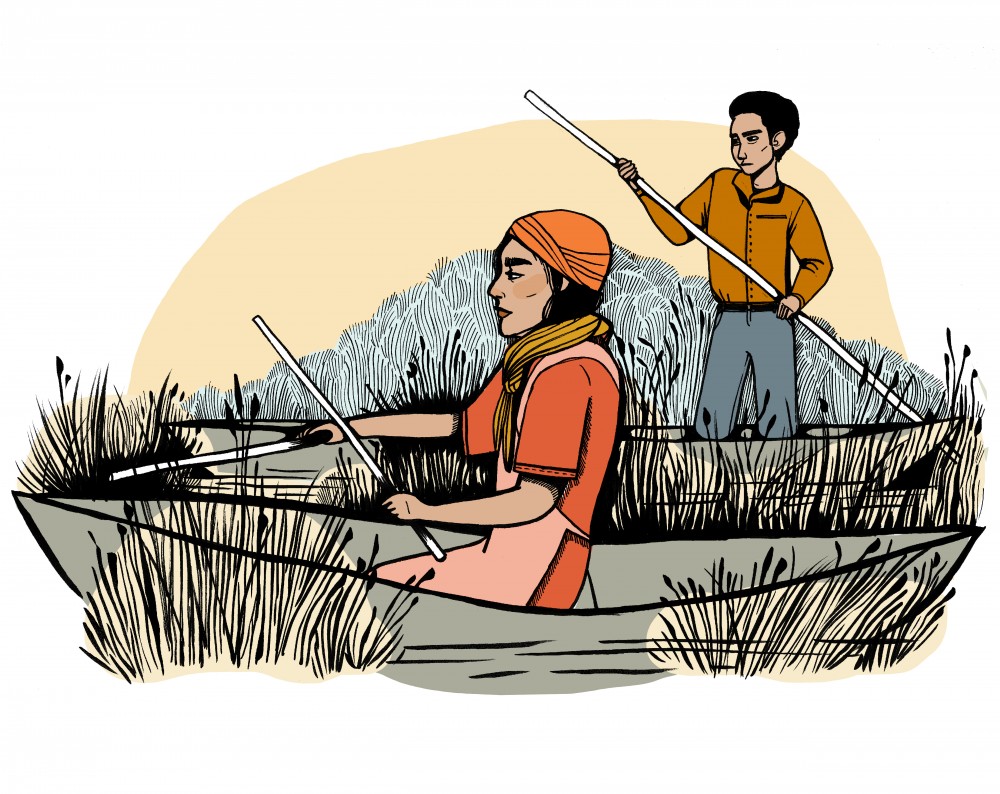For the past two years, River Spry has ventured out in his canoe to harvest wild rice. Spry, a forestry technician for the Grand Portage Band of Lake Superior Chippewa in northern Minnesota, said harvesting the tall, green stalks of wild rice is an intimate process.
“Just being out there, you are so connected to the plant and the Earth. It is a beautiful thing,” Spry said. “It changed my life. The rest of my life I will be a ricer.”
Spry, along with other tribal members, harvests wild rice for food but also to honor tribal culture and tradition around the grain. While Native American tribes have harvested wild rice, called manoomin in Ojibwe, for generations, about one-third of the wild rice in Minnesota has disappeared over the past century.
Because of the decline, University of Minnesota researchers are working with tribes through the Grand Challenges Initiative. Since last year, they have been examining why wild rice is disappearing and seeking ways to preserve its habitat while honoring sacred traditions surrounding the grain.
“We make sure the research is driven by our tribal partners and not the University,” said Michael Dockry, an assistant professor in the Department of Forest Resources who is involved with the work. “Our project is pretty unique and important, because it gives an example of how to work with tribes while protecting tribal sovereignty.”
Wild rice, which grows in water, has been declining because of environmental factors caused by human activity, said Thomas Howes, natural resources manager for the Fond du Lac Band of Lake Superior Chippewa. Part of the reason for the decline can be attributed to issues such as industrial pollution and poor water quality.
According to Howes, the Great Lakes region is the only place in the world wild rice grows.
“We have to do our best to take care of it,” he said.
While the Fond du Lac tribe has been able to revitalize their wild rice habitats, there continues to be a decline in the plant outside the reservation.
The grain is significant to many tribal communities. According to the migration story of the Anishinaabe, or Ojibwe people, the Creator instructed tribes to find the “food which grows upon the water.” Wild rice, or manoomin, was discovered in the Great Lakes region, and that is why people settled there.
Not only are University researchers doing this work to study and preserve the sacred grain, but also to repair the University’s relationship with local tribes – which has been rocky in the past.
“Our projects goal is to … really make sure we are researching wild rice collaboratively and making sure we understand what wild rice means to them,” said Crystal Ng, head researcher for the project.
Almost two decades ago, University researchers tried to develop a genetically engineered form of wild rice without input from tribes, which made tribal communities unhappy. They feared creating new forms of wild rice would contaminate the ecosystem for traditional wild rice, Howes said.
In a 2009 letter written by Anishinaabe tribal members and the University, some members of the University acknowledged wrongdoing.
“…virtually all wild rice research emerging from the University has reflected the goals and desires of non-Indians with little regard for native concerns, perspectives or the considerable store of traditional knowledge,” the letter read.
The letter was written to propose the University and Anishnaabe nations in Minnesota work to build a relationship built on mutual respect and reciprocity.
“The University messed this up royally previously,” Karen Diver, former chairwoman of the Fond Du Lac tribe, said regarding previous University work around wild rice. “It left a bad taste in tribal peoples’ mouths.”
Diver, who is an adviser for the Grand Challenge project, said researchers for this project are taking the time to establish good relationships and establish mutual respect.
Tribal members can add value to the research being done by sharing their knowledge accumulated from generations of being good stewards of wild rice, Diver said.
“Because of this respect, both sides can learn from each other.”
While it has not been easy to rebuild relationships and regain trust, Ng said the University researchers keeping their word and working collaboratively with tribes has helped the partnership.
“We are working together and really trying to heal a lot of what has happened in the past from us not working together,” Ng said.
Last month, tribal partners were invited to the University as part of President Joan Gabel’s inauguration week, to honor the research and relationship between tribal communities and the University.
Gabel said bringing community members together and doing work like this allows them to share both indigenous wisdom and scientific discovery.
While funding for the Grand Challenge project only goes through January 2020, researchers are looking to other funding sources to continue their work.
The long-term goal for researchers involved with the project is for the University to go beyond wild rice research and someday be a center of excellence for supporting tribal resource management.
One of Spry’s favorite parts of harvesting wild rice is that he feels personally connected to the food.
“We need to protect that.”
Clarification: A previous version of this article misrepresented who from the University was involved in the 2009 letter. University officials and researchers working on wild rice genetic breeding were not involved with the letter.
Correction: A previous version of this article misspelled Karen Diver’s last name.
















